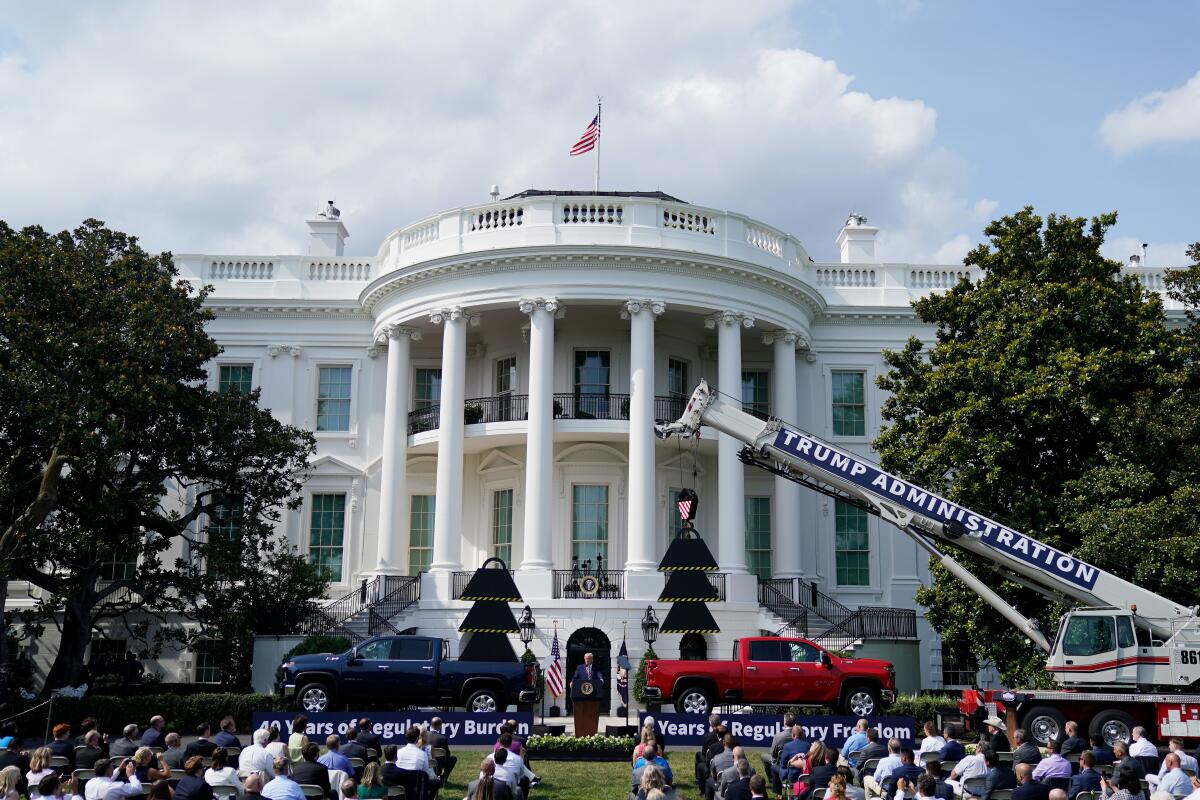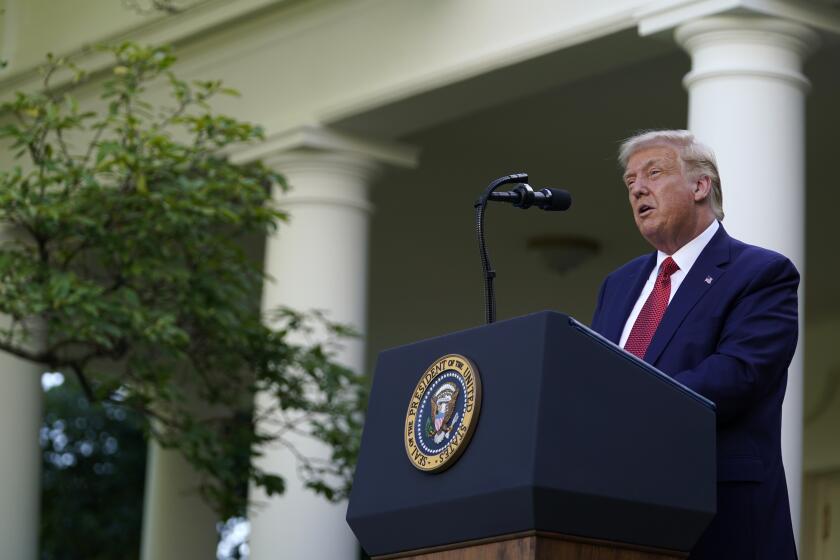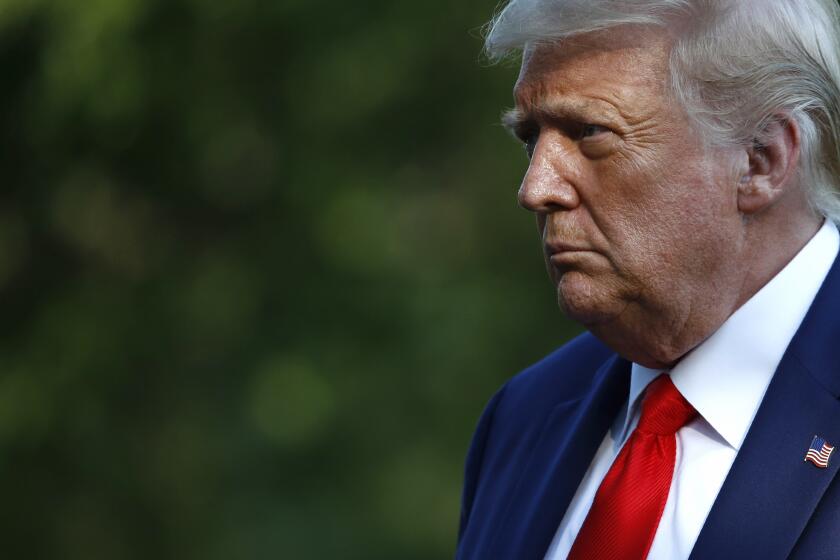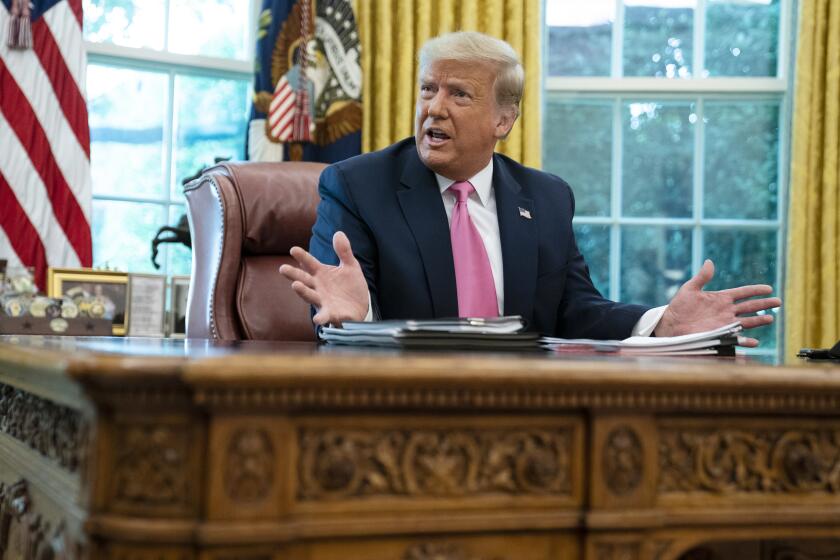Trump is ‘hijacking’ White House events for ‘partisan, political’ gain, experts say

- Share via
President Trump has railed against his 2020 election opponent in presidential forums. He turned a White House Rose Garden event into a hour-long campaign-style monologue. He posed in the Oval Office, thumbs up, behind Goya products lined up on the Resolute Desk after the company’s CEO faced backlash for praising him.
Trump, with limited options to campaign now that the coronavirus has all but canceled the rallies that supplied him with an adoring audience, is using the platform of the presidency for political gain as no one else has, experts say.
“Trump is hijacking White House events that are intended to communicate governmental policies,” said law professor Kathleen Clark, “and he’s transforming them into partisan, political events.”
The Trump administration has openly ignored many government ethics norms upheld by past presidents, experts say. And during the last few months, as his reelection prospects have dimmed over his handling of the pandemic and the economic fallout, Trump has escalated his mix of campaigning with presidential duties. The diatribes against rivals that have long been a cornerstone of his campaign speeches have seeped increasingly into taxpayer-funded events.
What has Trump done?
During the Rose Garden speech last week, an event presented as an announcement about China, Trump went on a lengthy attack on presumptive Democratic presidential nominee Joe Biden, claiming, among other things, that the former vice president’s “entire career has been a gift to the Chinese Communist Party.”
At an event on the South Lawn of the White House two days later, Trump spoke in front of two trucks. A blue truck held a pile of props meant to look like weights, over the message “40 Years of Regulatory Burdens.” Lifting the weights from a red truck was a crane labeled “Trump Administration.” The message underneath: “4 Years of Regulatory Freedom.” Trump attacked Biden at that event as well, warning he would enforce federal regulations “at a level that you haven’t even seen yet” and “abolish our beautiful and successful suburbs.”
On July 4, 2019, Trump put himself at the center of a celebration that featured tanks and military jets and the president speaking with the Lincoln Memorial in the backdrop. The White House quickly put out a campaign-style video using Trump’s voiceover and images from the taxpayer-funded event. Last month, mostly peaceful protesters near the White House were cleared with force, chemicals and flash bangs so Trump could pose in front of a nearby church holding a Bible. The White House released a 30-second video of Trump’s walk to and from the church the same day.
Trump’s presidency has been defined by a consistent record of using the federal government for his own financial, personal and political gain, Clark, a professor at the Washington University in St. Louis, said.
There have been “ethically challenged” presidents in the past, including President Clinton, who faced his own scandal, Clark said, but he did not use the federal government to benefit himself in the way Trump has.
“He is essentially the anti-ethics president,” she said of Trump.
Even when Trump has policy accomplishments to talk about, he often distracts from them with political attacks — a strategy that’s harmed his standing
Is it just him, or his staff too?
The transgressions of senior Trump officials violating government ethics has become such a pattern that their actions have become “a blueprint to use the levers of government to help President Trump maintain power,” Donald Sherman, deputy director of Citizens for Responsibility and Ethics in Washington, said.
Just months after being named White House chief of staff, Mark Meadows violated the Hatch Act when he endorsed Trump’s reelection campaign and criticized Biden during TV appearances, the watchdog organization CREW alleged in a complaint.
White House counselor Kellyanne Conway has been repeatedly investigated by the Office of Special Counsel, an independent federal and prosecutorial agency, and criticized by watchdog groups for violating the Hatch Act, a federal law meant to limit political activities of federal employees.
After Trump’s rambling speech in the Rose Garden, White House Press Secretary Kayleigh McEnany engaged in a brief back-and-forth with a reporter who asked where the administration draws the line when it comes to talking politics.
“We act in accordance with the Hatch Act. It’s well established that the president and vice president are not subject to the Hatch Act,” she said. “Go read the Hatch Act.”
She concluded, “What your real problem was, was the fact that the president gave a very good, powerful speech from the Rose Garden.”
What is the Hatch Act?
The Hatch Act is a 1939 federal law that limits federal employees’ political participation in order to protect federal programs from being carried out in partisan ways.
It is just one aspect of government ethics laws meant to keep government officials from using their official capacities for political, financial or personal gain, Clark said. Violating the Hatch Act can result in civil penalties following an investigation by the Office of Special Counsel, which is charged with determining whether a violation occurred.
The responsibility of carrying out recommendations by the special counsel depends on whether the employee was confirmed by the Senate, said Nick Schwellenbach, senior investigator for the Project on Government Oversight, a nonpartisan independent watchdog organization.
If the Office of Special Counsel determines a violation occurred by a federal employee not confirmed by the Senate (typically rank-and-file employees), the report goes to the U.S. Merit Systems Protection Board. For most senior White House employees and heads of agencies, reports would go to the White House, which decides what action to take, if any.
Penalties can include removal, demotion or being temporarily barred from federal employment; suspension; reprimand; or fines.
Does the Hatch Act apply to the president?
No. The president and vice president are exempt from the Hatch Act. But federal employees could be found in violation of the law if the Office of Special Counsel finds they participated in events they knew would become partisan, Schwellenbach said.
Sherman, of Citizens for Responsibility and Ethics in Washington, said the OSC had identified 13 senior White House officials as violating the Hatch Act in the last 3½ years. CREW had filed complaints on 11, he added. The agency said it did not generally make the results of its investigations public. “OSC’s findings are typically provided to only the complainant and the subject of the complaint,” said spokesman Zachary Kurz.
Past presidents and their staff have tended to avoid allowing campaign activity to seep into official business, experts say. Schwellenbach, a former communications director for the Special Counsel, said he advised Obama’s press secretary to avoid questions about the campaign during news briefings and emphasize the administration’s policies.
But Sherman said the Trump administration has a “clear hostility” toward such ethics. “President Trump has demonstrated time and time again that he is not interested in following those norms.”
Brushing aside polls showing his support down amid the worsening coronavirus outbreak, Trump won’t promise to accept the 2020 election result.
Ivanka Trump tweeting about Goya — did that violate the Hatch Act?
No.
Trump’s senior advisor and daughter Ivanka Trump recently caused an uproar when she tweeted a photo of herself holding a can of Goya beans with the caption “If it’s Goya, it has to be good” in Spanish and English.
The tweet did not violate the Hatch Act, Sherman said. But CREW believes she did violate ethics regulations with the endorsement, and it filed a complaint with the U.S. Office of Government Ethics, Sherman said.
Ivanka Trump’s Twitter bio identifies her as an advisor to the president, and White House employees are prohibited from endorsing services or products, the complaint points out. The organization previously accused Ivanka Trump of violating the Hatch Act when she tweeted a photo in June 2019 of Trump’s “Make America Great Again” campaign slogan from the account she uses for official government business.
Sherman likened Ivanka Trump’s propping up the business of a prominent Trump supporter, and the president’s efforts to bash his opponents during official events, to Americans being forced to absorb campaign messaging before reaching government offices.
“Imagine you called the CDC, or the Department of Veteran Affairs, to learn some information about the coronavirus or your access to veteran benefits,” he said, “but before you could get somebody on the phone, you had to listen to a campaign ad from the president for the president’s reelection.”
“That is essentially what the president and Ivanka Trump are trying to do.”
Trump has faced criticism from fellow Republicans for not focusing on policy. Veteran political consultant Karl Rove said during a Fox News interview after the Rose Garden event that Trump had the opportunity to send a strong message about his policy.
“Instead, we had this 64-minute long ... sort of pseudo-campaign event,” Rove said. He offered some advice to Trump: “Don’t use presidential events as campaign events; try and turn campaign events into presidential events.”
President Trump is restarting his regular briefings on the pandemic as the coronavirus crisis becomes impossible to ignore.
How does the Trump administration compare on ethics?
During the eight years of the Obama administration, at least two senior White House officials were found to have violated the Hatch Act by the Office of Special Counsel, according to experts.
“There’s no comparison in terms of scope and scale of violators and violations” of the current administration, Sherman said. He added that CREW identified at least 11 senior Trump officials as violating the Hatch Act, but the number “actually grossly understates just how many times folks in the Trump administration have violated the law.”
One example: CREW accused Conway of violating the Hatch Act more than 50 times on Twitter alone. “She has committed more violations of the Hatch Act than anybody that I’ve ever seen,” Sherman said.
Her behavior has prompted multiple investigations by the Office of Special Counsel. In a June 2019 letter, the special counsel said Conway was a “repeat offender” whose acts mirrored those outlined in a previous report. The agency found that she attacked Democratic presidential candidates during a media appearance as a White House representative and referred to Biden and Sen. Bernie Sanders as “two old white straight men career politicians.”
“OSC’s career Hatch Act staff have long conducted thorough and impartial investigations of alleged Hatch Act violations, including by senior officials in administrations of both parties,” Henry J. Kerner, the Trump-appointed special counsel, wrote in June 2019. “Never has OSC had to issue multiple reports to the president concerning Hatch Act violations by the same individual.”
Kerner called for Conway’s removal as a federal employee, a recommendation the White House rejected. But because Conway was not confirmed by the Senate, Sherman said, the recommendation should have gone to the Merit Systems Protection Board instead of the White House. CREW is suing the Office of Special Counsel.
In May 2019, reporters asked Conway about a previous report the year before from the OSC, which found her in violation of the Hatch Act. She dismissed the questions.
“Let me know when the jail sentence starts,” she said.
More to Read
Get the L.A. Times Politics newsletter
Deeply reported insights into legislation, politics and policy from Sacramento, Washington and beyond. In your inbox twice per week.
You may occasionally receive promotional content from the Los Angeles Times.














